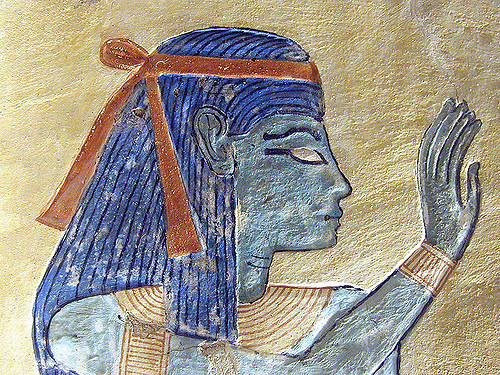“‘I am the things that are, that will be, and that have been. No one has ever laid open the garment by which I am concealed. The fruit which I brought forth was the sun.’”
The Ancient Egyptians had a formal, and beautifully named, observance for their Goddess Neith on this day in history, which celebrated Neith going forth along the river Nile.
As one of Egypt’s oldest Goddesses, Neith was an early goddess of creation, weaving and the loom. Her name also may be interpreted as meaning water. In time, this meaning led to her being considered as the personification of the primordial waters of creation. She was considered the oracular body of the great womb, the weaver of matter and said to have woven the world on her loom. As the divine patron of weavers, the linen wrappings of the mummy were produced by the “weavers of Neith” - bandages were the "gifts of Neith." Thus Neith protected the dead in yet another way. She was called the "Seamstress of the Cloth of Life, whose thread is gold, whose needles are fire." Despite being a goddess and mother, Neith was considered so powerful that she was described as androgynous, two-thirds of her person being male, and one-third female.
~
Going Forth is a common term that was used extensively to refer to religious festivals in Egypt. One source writes that at different times throughout the year the deity of a temple would travel to visit another deity or temple following a sacred path.
A text in the Roman Period temple of Esna describes how Neith created the world by speaking seven magical words. Everything Neith conceived with her heart came into being, including thirty gods, and then she went on to create the sun-god Ra, who himself created mankind. During her festival a statue of the goddess Neith was placed in the sunlight, to reunite her with her son. The statue was then sailed down the river on a barque shrine, as the celebrants danced and feasted.
Neith was considered to be one of the aspects of the Great Goddess of the Nile Delta region so when we look at this festival title - Going Forth of Neith along the River - we can assume that this may refer to a sacred path or journey along the Nile.
Egyptian Names Honoring Neith:
Neith-ikret,
Peftuaneith,
Neferneith ("Beautiful of Neith"),
Padineith ("He Whom Neith Gave"),
Meritneith (“Beloved of Neith”),
Ahaneith ("Neith the Fighter"),
Mer-Neith (“Neith is My Mistress”),
Neith-hotep (“Neith is Satisfied”),
Nakhtneith (“The One Whom Neith Protects”)
Sources:
"Senatorius Sacerdos Harpyiae : Immersions," Jean de Cabalishttps
"The Gods of the Egyptians", E. A. Wallis Budge
http://www. cowofgold.wikispaces.com/Neith
